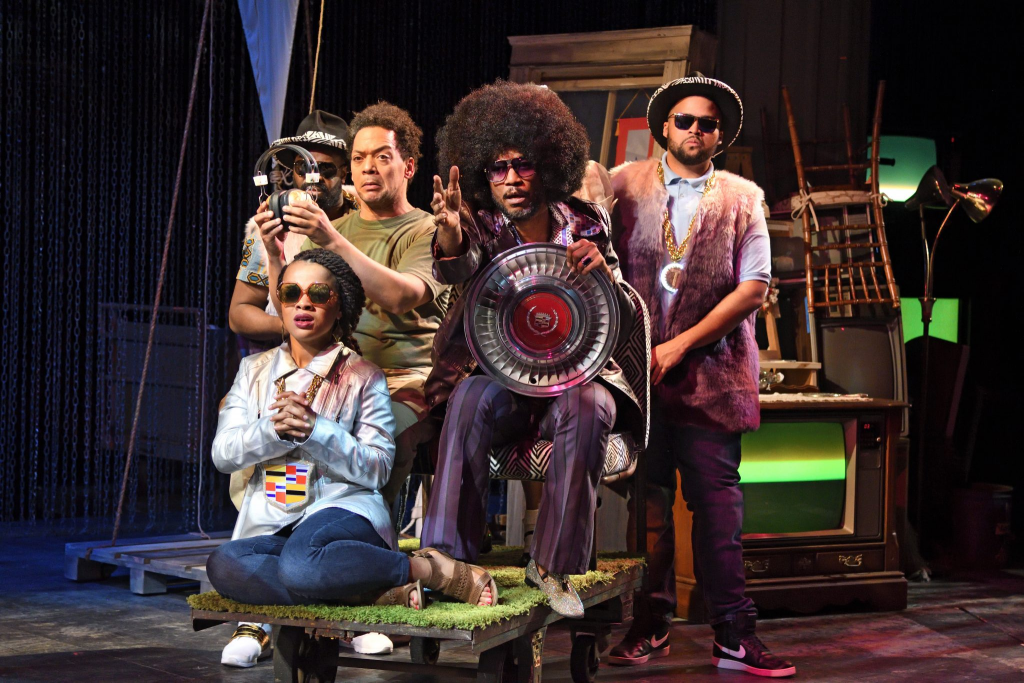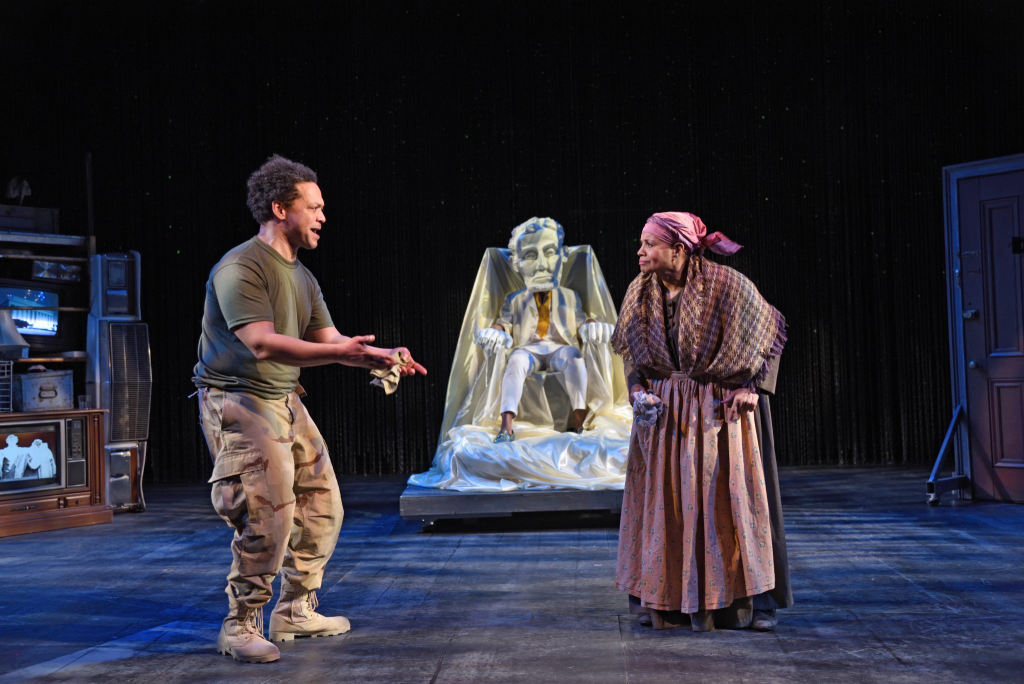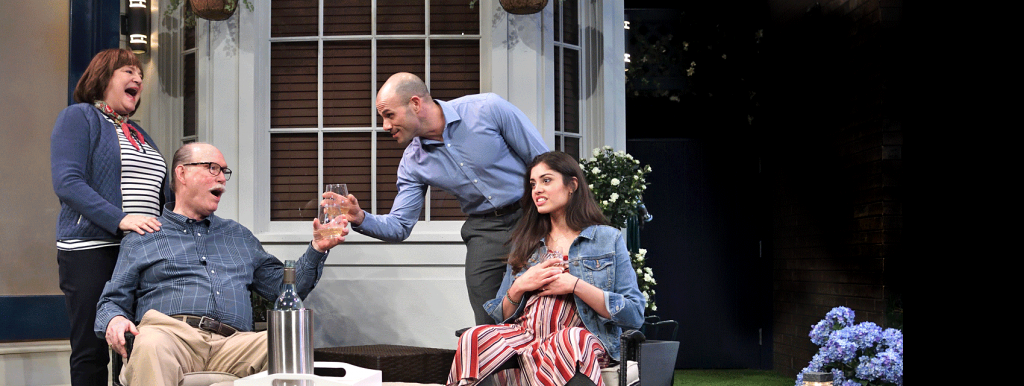10/29/19
By Shanel Smith
In the 2019-20 Season powerhouse members of Trinity Rep’s resident acting company Jude Sandy and Joe Wilson, Jr. came together to co-direct and act in black odyssey by Marcus Gardley. This year they are teaming up again for August Wilson’s Radio Golf with Jude directing and Joe as the lead character Harmond Wilks. As long time colleagues and friends we decided to peek into the working relationship between Jude and Joe.
black odyssey was an opportunity to see how a 13-year working relationship blossomed into a partnership able to withstand the challenge of bringing to life the vision of two different directors. They noted how their differing styles complemented each other, and how it also served as a catalyst for an open and transparent work environment not only between themselves but among the cast as a whole. Joe noted that he works “from the inside out” specializing in the psychological and emotional connection to his work.

On the other end of the spectrum is Jude, a movement artist who works best with the physical. He can see images and movements that the actors need to do in order to create a powerful moment. Joe shared that their differences in style forced them to push themselves in way that manifested a new level of trust. Jude also shared that while that in many ways black odyssey was a dream come true, and one of the deepest joys of his creative life, it was also a very formidable mountain to climb; however, “the trust that they had, based on a deep respect for each other’s artistic strengths” lead to an incredible experience.
Both emerged from the run of black odyssey with new appreciation for each other. Jude said this about Joe, “Joe Wilson, Jr. is one of the most vitally inspired, committed, earth-shaking artists I know, and more than anything he’s my family. It’s a real gift for me to be back with him.” And Joe absolutely feels the same. As they move into preparation for Radio Golf, they both note it is a “very different play with its own specific demands,” and though their roles are somewhat different, their essential partnership remains. They plan continue approach the project as a team, in order to blend their perspectives on stage.
When asked about his history with August Wilson, Jude informed us that until now it has been more educational than creative. As Africana Studies major in college he was introduced to Wilson’s plays while studying with beloved Brown professor and Rites & Reason Theatre’s artistic director Elmo Terry Morgan. An August Wilson monologue suggested by fellow Brown/Trinity Rep alum Nic Few (The Cherry Orchard at Trinity Rep) helped bring him to Brown/ Trinity Rep as a graduate student. Jude was able to see Denzel Washington and Viola Davis’s performance of Wilson’s Fences on Broadway in 2010, a theater experience he defined as “unforgettable”. Similarly, Joe shared that this is his first experience with Wilson’s work, and that he wants to someday play Corey in Fences as he related to the character. During his graduate education, Joe was cast as an understudy for the character of Corey at the notable Penumbra Theatre Company in Minnesota.

With that said, both Jude and Joe are enjoying exploring the language of August Wilson, who gave voice to the African-American experience within American theater. Understanding the magnitude of Wilson’s work, both view this experience as rite of passage and an opportunity for self-reflection, comparing their own experience to those in Wilson’s plays.
During his career Wilson wrote a series of plays referred to as the American Century Cycle which includes ten plays depicting African American history in the 20th century, with Radio Golf being the last play written in the cycle.
As the themes presented in the play are still evident in today’s society, we wanted to learn how the play resonates with Jude and Joe. They both agree that Radio Golf makes a clear statement by connecting the here and now with the past. Jude said that, “Wilson uses language and relationships to create a whole world and to invoke the vastness of our shared past, present, and potential futures in an intimate space, through the lives of people we easily recognize, some of whom we may be used to taking for granted.” From a directing standpoint, Jude is excited by the “flawed heroism” of all five characters in this story. “Each character brings a level of complexity that the audience can relate to. They are all either hurt or haunted in some way, but every one of them seeks to affect some good in the world around them.”
In preparation to play the leading character in Radio Golf, Joe has been re-reading the play for new discoveries. He is questioning his own Blackness and how he defines it in relation to world of the play, and how his life experiences can help shape the character he creates and the choices he makes on stage. In preparation to direct, Jude has been reading the full Cycle. He states that it his job “to investigate, collect and try to distill the themes, questions and resonances of his [Wilson’s] magnum opus and consider how they arrive in the world of Radio Golf.” Jude finds inspiration from the way the play looks at “individual gain versus a fuller community participation in the common good. It’s one of the big ethical problems of our time — how the unchecked ambitions of those with power can disenfranchise already under-served communities and disrupt the lives of fellow citizens who call those communities home.” Jude strives to go into production with as much knowledge as possible but recognizes the vast knowledge his cast will bring. He is prepared “to be their student and be led by them,” all while framing and interpreting the work.
